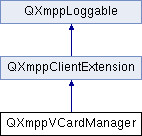|
QXmpp
Version:0.7.5
|
The QXmppVCardManager class gets/sets XMPP vCards. It is an implementation of XEP-0054: vcard-temp. More...
#include <QXmppVCardManager.h>

Signals | |
| void | vCardReceived (const QXmppVCardIq &) |
| void | clientVCardReceived () |
Public Member Functions | |
| QString | requestVCard (const QString &bareJid="") |
| const QXmppVCardIq & | clientVCard () const |
| void | setClientVCard (const QXmppVCardIq &) |
| QString | requestClientVCard () |
| bool | isClientVCardReceived () const |
 Public Member Functions inherited from QXmppClientExtension Public Member Functions inherited from QXmppClientExtension | |
| QXmppClientExtension () | |
| virtual | ~QXmppClientExtension () |
| virtual QStringList | discoveryFeatures () const |
| virtual QList < QXmppDiscoveryIq::Identity > | discoveryIdentities () const |
| virtual bool | handleStanza (const QDomElement &stanza)=0 |
| You need to implement this method to process incoming XMPP stanzas. | |
 Public Member Functions inherited from QXmppLoggable Public Member Functions inherited from QXmppLoggable | |
| QXmppLoggable (QObject *parent=0) | |
Additional Inherited Members | |
 Protected Member Functions inherited from QXmppClientExtension Protected Member Functions inherited from QXmppClientExtension | |
| QXmppClient * | client () |
| virtual void | setClient (QXmppClient *client) |
The QXmppVCardManager class gets/sets XMPP vCards. It is an implementation of XEP-0054: vcard-temp.
Getting vCards of entries in Roster:
It doesn't store vCards of the JIDs in the roster of connected user. Instead client has to request for a particular vCard using requestVCard(). And connect to the signal vCardReceived() to get the requested vCard.
Getting vCard of the connected client:
For getting the vCard of the connected user itself. Client can call requestClientVCard() and on the signal clientVCardReceived() it can get its vCard using clientVCard().
Setting vCard of the client:
Using setClientVCard() client can set its vCard.
| const QXmppVCardIq & QXmppVCardManager::clientVCard | ( | ) | const |
Returns the vCard of the connected client.
|
signal |
This signal is emitted when the client's vCard is received after calling the requestClientVCard() function.
| bool QXmppVCardManager::isClientVCardReceived | ( | ) | const |
Returns true if vCard of the connected client has been received else false.
| QString QXmppVCardManager::requestClientVCard | ( | ) |
This function requests the server for vCard of the connected user itself. Once received the signal clientVCardReceived() is emitted. Received vCard can be get using clientVCard().
| QString QXmppVCardManager::requestVCard | ( | const QString & | jid = "" | ) |
This function requests the server for vCard of the specified jid. Once received the signal vCardReceived() is emitted.
| jid | Jid of the specific entry in the roster |
| void QXmppVCardManager::setClientVCard | ( | const QXmppVCardIq & | clientVCard | ) |
Sets the vCard of the connected client.
| clientVCard | QXmppVCard |
|
signal |
This signal is emitted when the requested vCard is received after calling the requestVCard() function.
 1.8.1.2
1.8.1.2